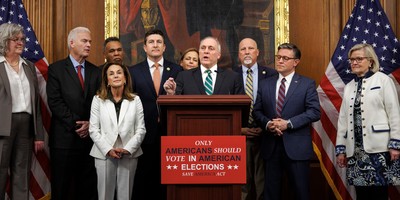Republicans agree that Obamacare has failed and must be repealed. But they can’t agree on the replacement “plan.”
The one thing they shouldn’t do is devise another grand scheme like the Obama “plan.” The answer is not a new and better big government “plan.” Instead, the president and Congress should take specific actions to free the market so patients and providers can create a health care system that serves everyone.
When President Barack Obama proposed his federal takeover of the healthcare system, he was right about one thing: American medical care was a mess. Government provided half the funding, created incentives for cost-plus care, and pushed insurance onto employers. While care cost more than it should for many, some people didn’t have access to the treatment they needed.
But instead of seeking to empower patients by giving them greater control over their own futures and more opportunities to find the best care possible in the marketplace, the president and Democrats in Congress took medical decisions away from the public and transferred them to Washington.
Unsurprisingly, that approach didn’t work. Insurers, mandated to discard actuarial principles in order to cover patients with serious pre-existing conditions, were forced to offer one-size-fits-all policies to cover everything from falling hair to sex change procedures. No wonder the cost of health insurance spiked. People got stuck paying for “benefits” they didn’t want.
Washington’s coverage mandates forced companies to cancel health insurance plans that employees had relied on for years. Patients were lucky to find replacements, and usually ended up paying a lot more for a lot less. Having coverage did not mean having access to care.
Young, healthy people who were supposed to sign up in greater numbers and pay a lot more to subsidize their well-off elders, understandably chose not to do so.
Recommended
Insurance companies were stuck serving a sicker population, causing them to lose money and drop plans. The promises of Obamacare proved to be false.
Republicans correctly believe the misguided law must be repealed. But what to replace it with, they ask.
The answer is nothing. At least, not in the sense of another comprehensive government program to set insurance requirements, mandate coverage, fix outcomes, and the like. Misguided government intervention created the health care mess we’ve got. It’s time we allow economic incentives and free market principles to solve the problem.
The solution is to free the market to innovate and experiment, to find the best way to provide quality coverage for less cost. For example, health insurers should have a national marketplace. Let people buy medical plans across state lines like every other kind of insurance. And bar states from imposing special interest coverage mandates that raise health insurance premiums for everyone.
Moreover, employees, not employers, should control their health insurance coverage. After all, none of us expects our company to buy us homeowners or auto insurance. The tax deduction could be shifted to individuals from businesses, or eliminated entirely with an equivalent individual income tax cut. Tax-free contributions to health savings accounts would enable people to finance the level of risk they’d be comfortable with.
The market today doesn’t have the flexibility to offer an answer, so government must get out of the way and encourage the private sector to do so. Those of limited means could be subsidized through vouchers to purchase their own private insurance. State high-risk pools could provide access to care for people with chronic or pre-existing conditions.
Medicaid needs to focus on the poor who have nowhere else to turn. Reform should emphasize allowing the states to provide better care for their most needy citizens without interference or mandates from Washington. States that do the best job will serve as models for others. Doctors who reject Washington’s cut-rate reimbursement rates need to be encouraged to re-enter the Medicare and Medicaid patient markets.
None of these measures constitutes a “plan” as such. Instead they each address a particular problem. In some cases they eliminate regulatory and tax barriers. In others they repair bad government incentives. In some instances they reward employers and providers of care to fill health care gaps.
The emphasis should be on addressing the individual problems in a coordinated manner. A workable reform requires targeted fixes designed to work interdependently, instead of one big “plan” requiring so many political compromises and tradeoffs that it would be doomed from the start.
It’s particularly important to get the principles and language right. We need to change the way policymakers think. Centralized government solutions don’t work regardless of who designs them.
We also need to change people’s expectations. The government should be the backstop for those without other options, not the protector of first resort.
The disaster called Obamacare provides an important reminder that we ignore at our peril. It is a fact that even the most well-intentioned programs designed by politicians and run by federal bureaucrats do not work. We can’t afford to ignore the lessons we’ve learned.
Instead, we need to restore and build on market principles that we know work, emphasizing the pragmatic over the ideological, and adapting to reality, not the world we wish existed.
People are suffering, so Congress needs to “fix” health care now. But not by repeating Obamacare’s ham-handed approach. Instead, policymakers should adopt a collection of logical steps to enable the marketplace to innovate and meet the diverse health care needs of the American people.

























Join the conversation as a VIP Member